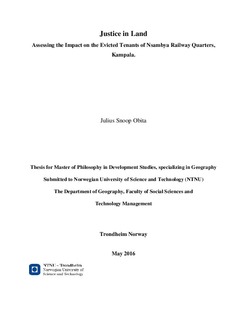| dc.description.abstract | The challenges that evictions pose to urban residents are viewed as a threat to their sustainable living. Such evictions are associated with urban growth and focus on urban renewal and economic investment. Several justifications that lead to evictions are related to existence of vacant land, open green spaces slums and areas with old buildings. Nsambya railway quarters were not only old but also centrally located within the proximity of the capital city, therefore it was an area of high value for renewal. Despite the fact that Nsambya railway was located in prime land with high land value, the manner in which the land was appropriated, was claimed to be unfair by the evicted tenants. As, this study explores land justice in Uganda and assess how it the process was applied on the eviction of tenants at Nsambya Railways Quarters (NRQ), located in Kampala the capital city and within the proximity of the city.
The research sheds light on the role of the formal institutions in enhancing justice in relation to land and promotion of land use rights. The aim of the study is therefore to examine whether land eviction of tenants in Nsambya railway quarters was done as required by the laws that uphold land rights and its impact to the affected people. The study combined different aspect of justice, political ecology, actor network and informalities to answer the raised research questions. To capture this information the study applied multiple methods that include; direct observation, interviews and photography which also included transect walks.
The study wraps up the major findings which revealed that there was no proper procedural process that was employed to smoothly carry out the eviction exercise. The thesis concludes that emphasis should be directed towards addressing institutional challenges like technical and financial support for establishing a comprehensive urban land management system. With the object of handling all the required processes, that include proper land acquisition, registration, development and use. Further it includes, display of information and adequate communication, regarding the availability of the land, its state and conditions of the land. It is not the law that is a problem because it is in line with the principle of justice, but the implementation of the law has been affected by power and self-interest that leads to conflicts of the production of urban environment that marginalize the urban poor and benefit the investors and the government. | nb_NO |
